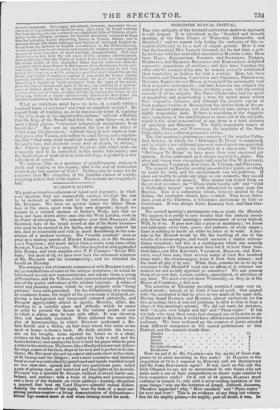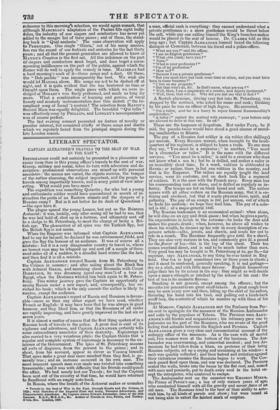. WORCESTER MUSICAL FESTIVAL.
THE very antiquity of this triennial celebration makes us approach it with respect. It is advertised as the " hundred and seventh meeting of the three Choirs of Worcester, Gloucester, and Hereford ;" and we cannot help feeling the orchestra of this ve- nerable Cathedral to be ,a sort of classic ground. Here it was that the beautiful Miss LINLEY charmed, for the last time, a pub- lic audience with her unrivalled execution of HANDEL'S airs. Here have MARA, BILLINGTON, SALMON, and STEPHENS, NORRIS, Now we put it to Mr. CLARKE—are the merits of these corn posers to be rated according to this scale ? Is HANDEL in the proportion of 70 to 1 superior to MOZART, and are BEETHOVEN and Sir JOHN STEVENSON equal ? If not, (and on this side the Irish Channel we are not so accustomed to rate them) why not make such a use of their compositions as shows some relation to respective ranks ? Or if, out of 88 pieces, HANDEL must continue to furnish 71, why such a never-ending repetition of the same things ? why are the oratorios of Joseph,. Deborah, Susanna,. Theodora neglected ? why, " How excellent " and "Pious orgies ". for ever and ever? This is an evidence of any thing but venera-, lion for his mighty genius,—for mighty, past all doubt, it was, In HARRISON, and BRAHAM, REINHOLD and BARTLEMAN, delighted successive generations of auditors ; and here have CRAMER the elder and the younger (long may he remain young !) established their reputation as leaders for half a century. Here, too, have GIARDINI and FISCHER, CERVETTO and CROSDILL, GRIESBACH, HOLMES, SARJEANT and HYDE, ill turn held the sovereignty over their respective instruments ; and here LINDLEY has reigned the undisputed master of his throne for thirty years, with the cordial consent of all his subjects. The Three Choirs have had the merit of originating and perpetuating a taste for sacred music within their respective dioceses ; and although the juvenile vigour of their younger brother at Birmingham has outrun them in the ca- reer of musical enterprise, yet their festivals have always held a highly respectable rank. If there is something of the sluggish- ness, something of the unwillingness to move out of the old path, which is the usual concomitant of age, there is a total absence of quackery and flimsiness. The highly.respectable names of CLARKE, MUTLOW, and WHITFELD, the organists of the three Cathedrals, are a sufficient guarantee of this. The first morning's performance consists of the regular Cathe- dral Service, in which the " Dettingen Te Deum" is comprised, and to which a few additional pieces of sacred music are appended. On this day the public are admitted at a cheap rate. Of the " Dettingen Te Deum" we have more than once expressed our opinion. It was performed, as it always ought to be, entire. The solos and verses were exceedingly well sung by Mrs. W. KNYVETT, and BRAHAM, VAUGHAN, KNYVETT, E. TAYLOR, and PHILLIPS.
The concert on Tuesday evening presented few points on which we could lay hold, and the arrangement was not judicious. If glees are worthy to retain any place in our concerts, they should have a fair chance of success. This chance was denied them on the present occasion ; for "When winds breathe soft" and " Cold is Cadwallo's tongue" were both introduced by songs from DE BEGNIS. This is a collocation which, however desired by the Italian, the conductor should have resisted. They never intro- duce, even at the Theatres, a Christmas pantomime by Cato or Coriolanus. It was always JOHN KEMBLE first, and then GRP.' MALDI.
The second morning's performance was, as usual, the Messiah. We suppose it is partly to save trouble that this oratorio invari- ably forms the second morning's entertainment of every festival. Well, be it so. It goes.now like a piece of machinery; we know and anticipate every turn, grace, and cadence, of every singer ; there is nothing to excite us either to listen or to write. A mis- take in the Messiah would be like the breaking of one of the wheels of a steam-engine,.and would occasion a similar extraor- dinary sensation ; but this is a contingency which one scarcely contemplates,—for CRAMER must have led it at least three hun- dred times, and Mrs. KNYVETT, VAUGHAN, BRAHAM, and KNY- VETT, must have sung their several songs at least five hundred times each ; the chorus-singers learn it from their infancy ; and the band all play it by rote. What, then, remains for us to say in reference to the Messiah ? what can we affirm of' it, whereof our readers are not as fully apprized as ourselves ? We can possess them of no new fact, version, reading, amendment, or alteration of any kind. We must e'en put down Wednesday, as they do at the House of Commons, a dies non.
The selection of Thursday morning contained some very ex- cellent music ; indeed, of its kind, it was all good. Our quarrel with the conductor is that he gives us too much of the same dish. Having heard HANDEL and HANDEL almost exclusively for the two preceding clays, it was not judicious to allot to him so large a share of this morning's scheme. We did not want, for instance, both "Angels ever bright and fair" and "Pious orgies." If the fair lady who sung these songs had changed one of them for an air of MOZART or HAYDN, it would have afforded more pleasure to the audience. We have reckoned up the number of pieces selected from different composers in the sacred performance of this
Handel
71
Haydn
9 •
Boyce
5
Mozart
1
Sir John Stevenson
1 Beethoven ...... . . .I Festival, and the account stands thus : reference to this mornings selection, we would again remark, that although MARCELLO'S adaptation of the Psalms fills eight bulky folios, the industry of our singers and conductors has never yet added to the meagre list of three pieces ; and of these, the stand- ing hack is " Qual anelante." The same observation will apply to PERGOLESI. One single "Gloria," out of his many masses, has run the round of our festivals and oratorios for the last thirty years ; and all that the present generation are allowed to know of HAYDN'S Creation is the first act. All this indolence on the part of singers and conductors must beget, and does beget a corre- sponding indifference on the part of the public, against which the former will do well to apply the remedy in time. MALIBRAN had a hard morning's work of it—three songs and a duet. Of these, the " Deh parlate " was incomparably the best. We wish she would let HANDEL alone. His songs are not to be dashed off at sight, and it is quite evident that she has bestowed no time or thought upon them. The single piece with which we were in- dulged of MOZART'S was finely performed, and made us long for more. What a combination of learning and genius, of vocal beauty and masterly instrumentation does this motett (" the tri- umphant song of Israel ") contain ! The selection from HAYDN'S Second Mass was equally delightful. The beautiful " Qui tolls " was effectively sung by PHILLIPS, and LINDLEY'S accompaniment was of course perfect. The last evening concert presented no feature of novelty or peculiar interest, but consisted chiefly of those songs and duetts which we regularly heard from the principal singers during the late London season.



























 Previous page
Previous page